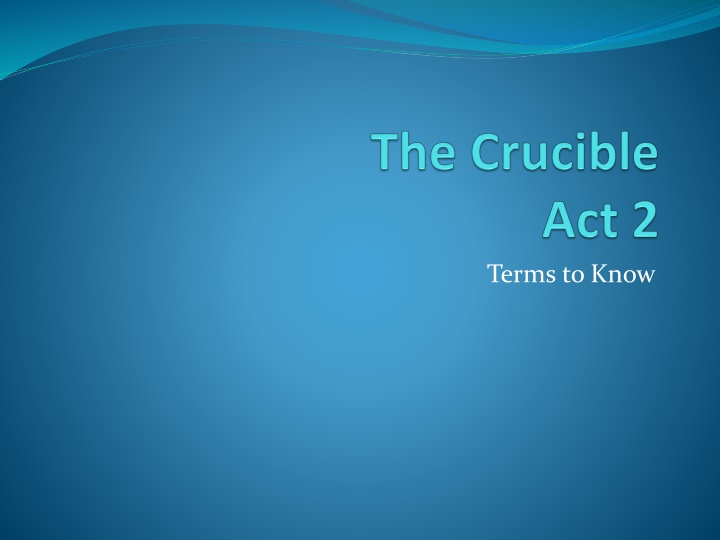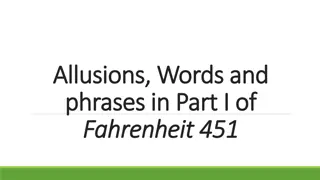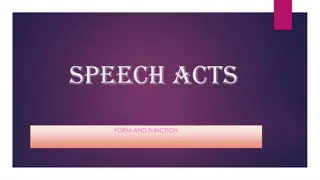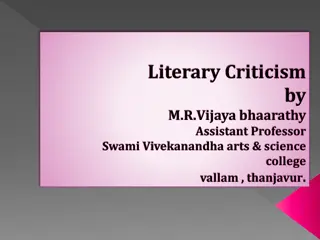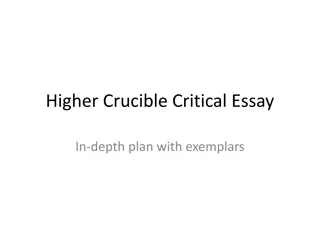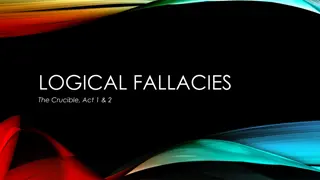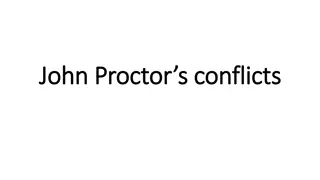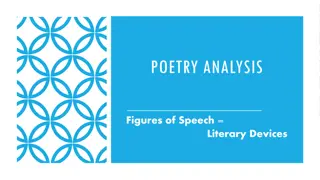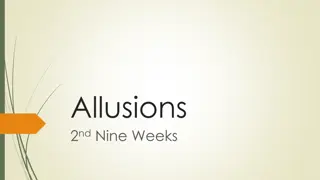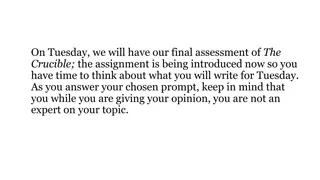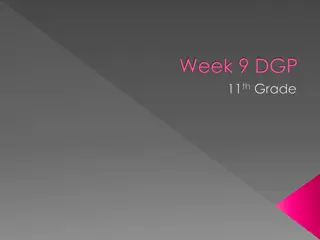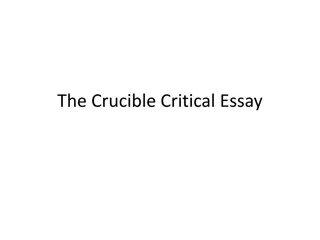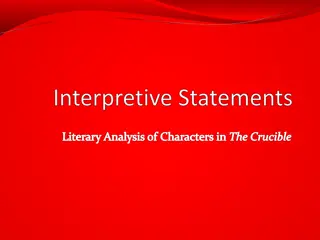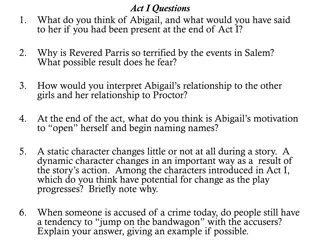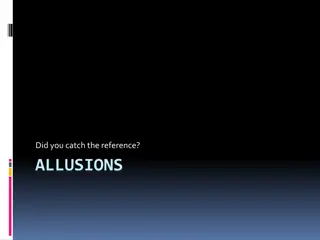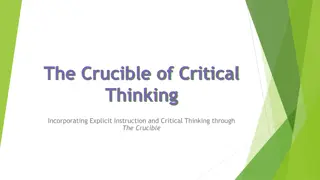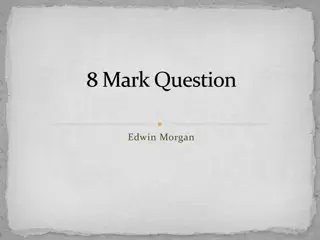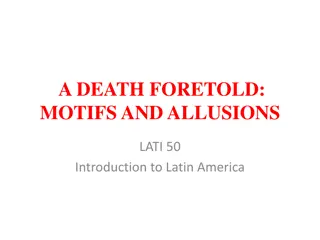Literary Analysis in "The Crucible": Allusions and Conflicts in Acts 1 and 2
Explore the use of allusions and conflicts in Acts 1 and 2 of "The Crucible." Uncover the significance of biblical allusions, historical contexts, and internal and external conflicts within the play. Delve into character dynamics, societal tensions, and the interplay of literary elements in this classic work by Arthur Miller.
Download Presentation

Please find below an Image/Link to download the presentation.
The content on the website is provided AS IS for your information and personal use only. It may not be sold, licensed, or shared on other websites without obtaining consent from the author.If you encounter any issues during the download, it is possible that the publisher has removed the file from their server.
You are allowed to download the files provided on this website for personal or commercial use, subject to the condition that they are used lawfully. All files are the property of their respective owners.
The content on the website is provided AS IS for your information and personal use only. It may not be sold, licensed, or shared on other websites without obtaining consent from the author.
E N D
Presentation Transcript
Allusion ALLUSION: A casual reference in literature to a person, place, event, or another passage of literature, often without explicit identification. Allusions can originate in mythology, biblical references, historical events, legends, geography, or earlier literary works. Authors often use allusion to establish a tone, create an implied association, contrast two objects or people, make an unusual juxtaposition of references, or bring the reader into a world of experience outside the limitations of the story itself. Authors assume that the readers will recognize the original sources and relate their meaning to the new context. http://web.cn.edu/kwheeler/lit_terms_A.html
Allusions in Act 2 Allusion 1. What does the biblical allusion to Moses and the parting of the Red Sea suggest about how the crowd views Abigail? 2. (a) What does John Proctor s allusion to Pontius Pilate imply about Proctor s opinion of Reverend Hale? (b) What does the allusion to Pontius Pilate imply about the witchcraft proceedings in Salem? Connecting Literary Elements 3. In what way do details of historical context, including the status of women, explain why women were accused of witchcraft? 4. Knowing that keeping the Sabbath and attending church services were strictly enforced by the Puritans, how do you interpret John Proctor s exchange with Reverend Hale about the baptism of Proctor s sons? Explain. 5. The Puritans lacked laws to protect people from illegal searches and arrests. How does this fact add to your appreciation of the scene in which Elizabeth Proctor is apprehended?
Links to Allusions in Act 2 http://julienj.wikispaces.com/file/view/act2+alle%3Du sion.pdf https://sites.google.com/site/mrbrimhall/pages/the- crucible/the-crucible-act-ii-1
Conflict CONFLICT: The opposition between two characters (such as a protagonist and an antagonist), between two large groups of people, or between the protagonist and a larger problem such as forces of nature, ideas, public mores, and so on. http://web.cn.edu/kwheeler/lit_terms_C.html
Types of Conflict: Internal Internal: Man vs. himself Others? Internal conflicts in Acts 1 &2? Parris? Betty? Proctor? Goody Proctor? Mrs. Putnam? Abigail?
Types of Conflict: External External: Man vs. man; Man vs. Society; Man vs. Nature; Man vs machine External conflicts in Acts 1 and 2?
What is a Crucible? cru ci ble [kroo-suh-buhl] Show IPA noun 1. a container of metal or refractory material employed for heating substances to high temperatures. 2. Metallurgy . a hollow area at the bottom of a furnace in which the metal collects. 3. a severe, searching test or trial.
Dialogue The lines spoken by a character or characters in a play, essay, story, or novel, especially a conversation between two characters, or a literary work that takes the form of such a discussion. How does Arthur Miller use dialogue to move the events of the plot and develop characters? http://web.cn.edu/kwheeler/lit_terms_D.html
Irony Actuality vs. Expectation Cicero referred to irony as "saying one thing and meaning another. Irony in Act 1 and 2: The entire town began listening to the little girls and allowed them to determine who was accused of witchcraft. How ironic that they listened to them during this time when little girls typically have no voice and no valuable opinions.
Situational Irony Situational irony (also called cosmic irony) is a trope in which accidental events occur that seem oddly appropriate, such as the poetic justice of a pickpocket getting his own pocket picked. However, both the victim and the audience are simultaneously aware of the situation in situational irony--which is not the case in dramatic irony. http://web.cn.edu/kwheeler/lit_terms_I.html
Verbal Irony Verbal irony (also called sarcasm) is a trope in which a speaker makes a statement in which its actual meaning differs sharply from the meaning that the words ostensibly express. Often this sort of irony is plainly sarcastic in the eyes of the reader, but the characters listening in the story may not realize the speaker's sarcasm as quickly as the readers do. http://web.cn.edu/kwheeler/lit_terms_I.html
Dramatic Irony Dramatic irony (the most important type for literature) involves a situation in a narrative in which the reader knows something about present or future circumstances that the character does not know. In that situation, the character acts in a way we recognize to be grossly inappropriate to the actual circumstances, or the character expects the opposite of what the reader knows that fate holds in store, or the character anticipates a particular outcome that unfolds itself in an unintentional way. Probably the most famous example of dramatic irony is the situation facing Oedipus in the play Oedipus Rex. http://web.cn.edu/kwheeler/lit_terms_I.html
